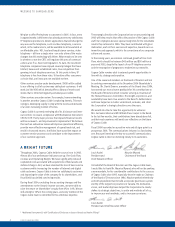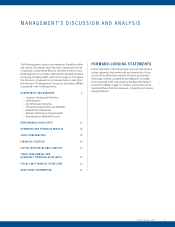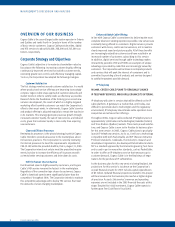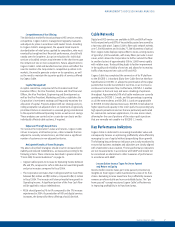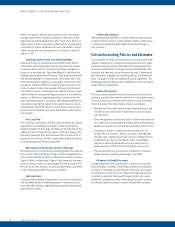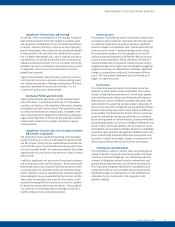Cogeco 2004 Annual Report Download - page 16
Download and view the complete annual report
Please find page 16 of the 2004 Cogeco annual report below. You can navigate through the pages in the report by either clicking on the pages listed below, or by using the keyword search tool below to find specific information within the annual report.
MANAGEMENT’S DISCUSSION AND ANALYSIS
14 Cogeco Cable Inc. 2004
The CRTC has recently modified the carriage status of TSN (The
Sports Network), RDS (Réseau des sports) and CMT (Country
Music Television). TSN and RDS are presently carried by Cogeco
Cable as part of the basic cable service at a prescribed maximum
wholesale rate. Should the CRTC decision stand, Cogeco Cable
could face a request to move these two sports services back
to a discretionary tier and to pay higher wholesale fees to CTV
Specialty Services Inc. Cogeco Cable and others have applied
to the Federal Court of Appeal for leave to appeal this CRTC
decision, but the outcome is not known at this time.
The distribution of certain video and audio programming services
entails the payment of fees to various copyright collectives
pursuant to tariffs set by the Copyright Board under the authority
of the Copyright Act (Canada). While new SOCAN tariffs for music
in speciality and pay television services have recently been set by
the Copyright Board, tariffs proposed by copyright collectives for
retransmission of distant signals, pay audio services distributed
to residential customers, and for background music services
distributed to commercial establishments are still under review
by the Copyright Board.
The market for long haul IP data transmission capacity has started
to consolidate, most notably with the acquisition of GT Group
Telecom by Bell Canada. As this sector further consolidates
and more installed capacity is used for growing Internet traffic
and other data transmission, this cost component could face
new pressure.
Contract renewals with electric distribution utilities are cur-
rently pending for approximately 42% of the poles used by the
Corporation in Ontario. The two largest electric power utility
suppliers of support structures for the Corporation’s cable plant
are Hydro One in Ontario and Hydro-Québec in Québec. The
Hydro One contract is due to expire on December 31, 2004, and
the Hydro-Québec contract is due to expire on December 31, 2005.
The Canadian Cable Television Association has applied on behalf
of its members to the Ontario Energy Board (OEB) to have pole
rates set for electric distribution utilities that the OEB regulates
in Ontario, but the outcome of this proceeding will not be known
for some time. The Corporation expects that its average cost per
pole will likely rise in the next few years but cannot determine the
extent of the increase at this time. Relations with most suppliers
of support structures are considered satisfactory, with interim
arrangements being negotiated in Ontario pending the final
determination of the OEB.
Business Processes and Information Systems
Cogeco Cable is presently conducting a detailed review and assess-
ment of its business processes and information systems with a
view to meeting new certification requirements in connection with
its interim and annual financial statements. This review, which
is carried out by the Corporation’s financial control group with
external support from a large international professional accounting
firm, may lead to recommendations on improvements or changes
to certain processes or information systems which, in turn, could
involve unforeseen capital or operating expenditures, if and when
such recommendations are issued.
Throughout fiscal 2005, work will still take place on improvements
to information systems and data security, as well as on the testing
of the business continuity and disaster recovery plans required in
the event of major contingencies such as natural disasters, health
quarantines, power outages, terrorist actions, security breaches,
hacking or corruption of data. Insurance undertakers no longer
provide coverage for loss of data under the existing insurance
programs. This risk is managed through internal controls, as well
as security and disaster recovery plans and procedures. Despite
such planning and testing, contingency plans and procedures may
not necessarily succeed in effectively preventing or limiting loss of
data or business interruption as expected if an actual event occurs.
Labour Relations
The collective agreement in the Québec Division expired on
December 31, 2002, and negotiations for a renewal term are
ongoing. Approximately 28% of the Corporation’s aggregate
workforce is covered by this collective agreement. While labour
relations are considered satisfactory, the impact of renewal terms
will not be known until negotiations are concluded. While either
party could be in a position to take labour action within fiscal 2005,
management does not anticipate any labour disruptions at this
time. There are no collective agreements in the Ontario Division.


